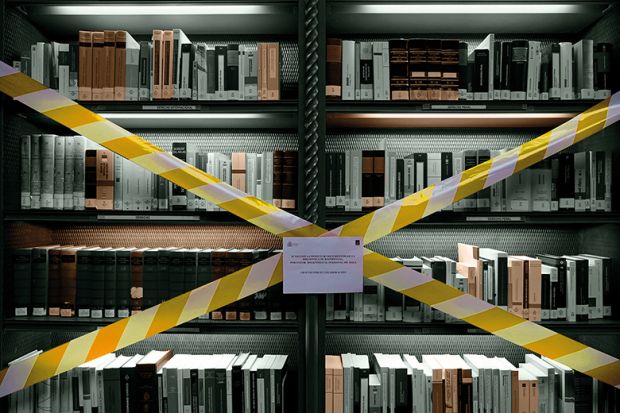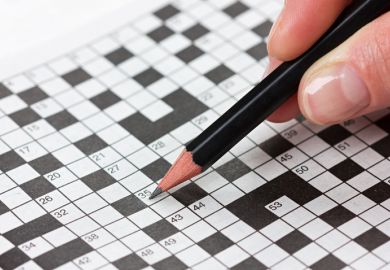I have not been inside a library since March. University libraries are rationing their footfall with booking systems, shelves cordoned off with tape, and books available via click and collect. I have left our library to the students, who need it more than me. But it hasn’t been an easy sacrifice; we “library cormorants”, as Coleridge called us, feel expelled from our nests.
I have long thought that the beating heart of a university is its library – the most welcoming and egalitarian space on campus. Go there to finish your essay, daydream, keep warm, watch a football game live on some bootleg online channel – no one minds. The library offers you free wi-fi, a workspace, reading matter, warmth, light and peace, not all of which everyone finds at home. I miss that mood of industrious quiet, captured in the sound of hundreds of students two-finger tapping at keyboards, like soft summer rain pattering on a tent.
I miss other libraries, too. One day I will again sit in the reading room of the British Library, finding solace in the benign indifference of the readers around me. A library offers, in Zadie Smith’s words, “an indoor public space in which you do not have to buy anything in order to stay”. The argument that we have less need of a library in a digital age errs, she writes, in seeing it “as a function rather than a plurality of individual spaces”. A library is a beautiful paradox: a public building that enshrines the private acts of reading, writing and thought.
I suppose the pandemic has taught us that, if needs must, we can survive without libraries. The history of scholarship is full of people who, when banished from them, make a virtue of the loss. “Lock up your libraries if you like,” wrote Virginia Woolf, after being refused entry to a Cambridge college library, “but there is no gate, no lock, no bolt that you can set upon the freedom of my mind.”
Woolf’s ambition was to write a history of English literature entirely from memory. Eric Auerbach, exiled in Istanbul during the Second World War, was nearly reduced to this. Deprived of the European sources he needed, he focused instead, in his classic book Mimesis, on brilliant close readings of Western classics, from Homer to Woolf. He ascribed the book’s existence to “just this lack of a rich and specialised library”. Forced to wade through the vast secondary literature, he might never have got around to writing it.
Still, the pull of libraries is as much emotional as practical. They offer the comforting illusion that in their unearthly calm and Dewey Decimal order we will at last be able to quiet our neuroses, remake ourselves and return to the world revived and repaired. The scholarly life can be solitary and dispiriting. Doing research often feels like treading water. Libraries instil in us an emboldening sense of collective enterprise. They are, in David Attenborough’s words, “immense communal brains…extra-corporeal DNA, adjuncts to our genetical inheritance”. They make knowledge, in its wonderful but dizzying abstraction, concrete and tactile. I used to remind students that the books in the library are still known as “holdings”, and that sometimes it is nice to hold them. I am saving this advice for when doing so is once again Covid-compliant.
How cruel, then, that this physical quintessence of our collegiality – with its books thumbed by countless unnamed others, its hot-desking computer workstations, its large atria where hundreds breathe the same air – is now such a contagious and perilous place. As well as attacking our respiratory systems, the virus has attacked this idea of ourselves as social animals, who want to be near each other even if we might work more quickly and cost-effectively alone.
My nostalgia for libraries may be sentimental, but so what? Human beings like to anchor themselves in familiar places. In a famous essay, George Orwell rhapsodises about his ideal pub, “The Moon Under Water”. At the end, Orwell admits what perceptive readers have already guessed: his perfect pub does not exist, being only an amalgamation of the best aspects of all the imperfect pubs he has known.
On the same principle, in lockdown I have been imagining my perfect library. In my mind’s eye I see a single, large room panelled in dark wood, with soft pools of light emanating from green table lamps, and high-backed, padded chairs with sturdy armrests that miraculously fit under the desks. The bookshelves are as tall as double-decker buses, their upper limits accessed by ladders. On the mezzanine floor, reached by iron spiral steps, there are nooks and recesses where you may retreat further from the world. Plane trees rustle gently outside; the sunlight filters through them to leave a lovely dappling effect on the parquet floor. The room has only a few other occupants, none of whom have annoying coughs or sniffles. This perfect library is small, but by some magically self-replenishing process has every single book I need.
John Betjeman reputedly said that in the event of Armageddon, he would head to the haberdashery department of the Peter Jones department store in Sloane Square, “because nothing unpleasant could ever happen there”. I feel the same way about my perfect library. One day I hope to resume my search for it.
Joe Moran is professor of English and cultural history at Liverpool John Moores University.
POSTSCRIPT:
Print headline: I can’t wait for the reopening of universities’ beating, bookish hearts
Register to continue
Why register?
- Registration is free and only takes a moment
- Once registered, you can read 3 articles a month
- Sign up for our newsletter
Subscribe
Or subscribe for unlimited access to:
- Unlimited access to news, views, insights & reviews
- Digital editions
- Digital access to THE’s university and college rankings analysis
Already registered or a current subscriber?










